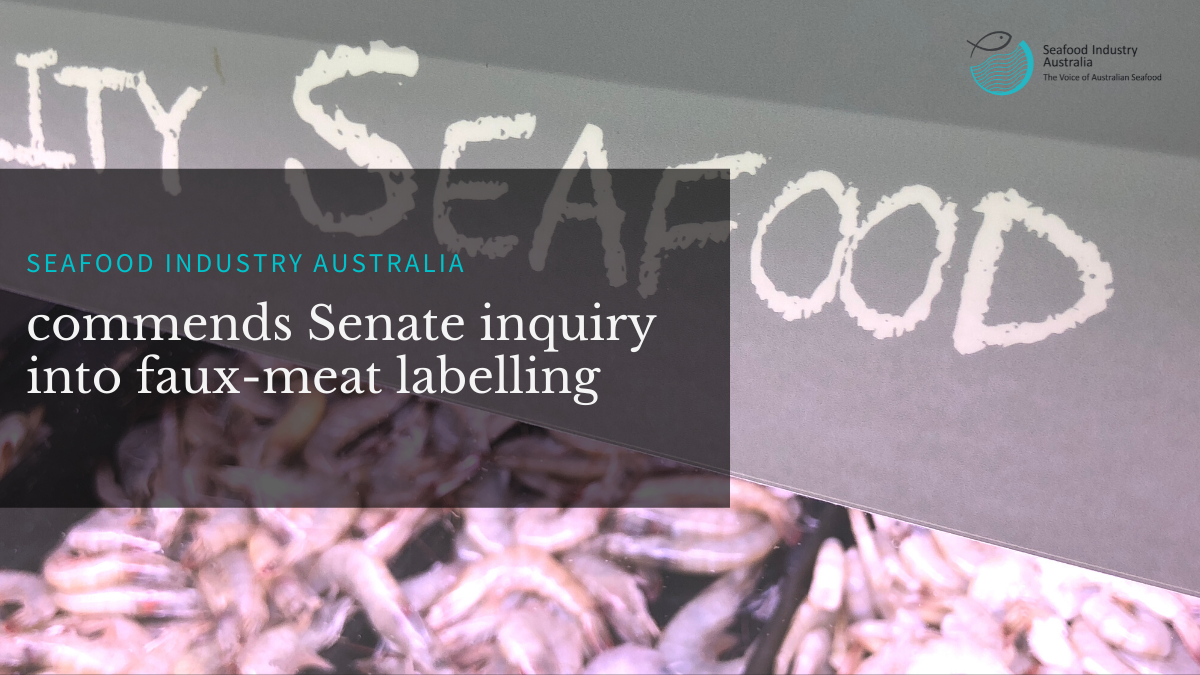Seafood Industry Australia (SIA), the national peak-body representing the Australian seafood industry, has commended the Commonwealth Senate Inquiry into the labelling of alternative protein products, and highlighted the need to protect the definition of seafood.
“This inquiry is vital for the animal-based protein industries to protect our name, definitions, brands and integrity systems,” SIA CEO Veronica Papacosta said.
“We must protect the definition of seafood, and ensure it is only applied to true, aquatic seafood species.
“Misleading origin statements and the subsequent mislabelling of synthetic or plant-based products as actual animal-based protein generates confusion amongst customers and consumers, and undermines the Australian seafood industry, along with the dedication and commitment of fishing families and businesses alike.
“We firmly believe the sale of products marketed as ‘seafood ‘ or associated subspecies, which are in actual fact synthetic or plant-based, threatens the sustainability and commercial viability of not just our businesses, but of the entire animal-based protein sector.
“More and more of these plant-based products are being sold in supermarkets right around the country and it’s clear their labelling is becoming increasingly deceptive. I know first-hand that consumers find this labelling confusing, particularly older Australians or those with English as a second language. Even we’ve been duped by them, and we know they exist.
“We’re also concerned consumers could be misled by packaging and labelling that closely resembles established seafood products in the market, like prawns or canned seafood. There are legitimate concerns for consumers with allergies to soy proteins, who seek out seafood only to mistakenly purchase a product that contains something completely different.
“Worse still, these highly processed products don’t have the same nutritional value as our seafood. It needs to be clear that these plant-based products have been heavily manufactured and lack the nutritionally benefits of eating true, honest Australian seafood.
“We welcome increased consumer competition however it is important it is done in a fair, honest and balanced regulatory environment. We advocate for plant-based proteins to establish themselves in a category of their own. We’ve seen successful category creation in the past with the development of margarine, and the push-back that it could not be branded butter.
“We respect people’s rights to make choices about what they eat. If you’d rather tofu than Tuna, soy than Salmon, or potatoes over Prawns, then go for it, but don’t tell people they’re eating seafood.
“As an industry, we are world-leaders in sustainable fishing. Consumers and seafood businesses alike are continuing to place a focus and priority on sustainable practices, so it is important our name and products are not compromised by soybeans and other plant-based proteins of mixed origins with varying sustainability credentials.
“Food traceability, especially seafood traceability, is becoming increasingly important both domestically and internationally as a way to verify both origin and sustainability claims. If we allow for compromise in the name and labelling of protein sources like seafood, this presents great implications for both traceability and origin verification.
“We know that mislabelled products can significantly devalue our exports. We need to place value in our seafood traceability and sustainability statements, which are key pillars that set Australian agricultural products apart from the rest and underpin confidence in brand-Australia produce.
“As a country we should be proud of what we produce and how it is marketed. The Australian seafood industry directly supports more than 15,000 Australian jobs, and countless more downstream in transport, logistics, and processing. Australian seafood accounts for 10% of national agricultural production, and contributes $3.5 billion in gross domestic product annually to the Australian economy. We are proud of the contribution we make to the Australian economy and the regional communities where our producers are based each year.
“The way these products are marketed is becoming un-Australian and don’t pass the pub test. If a product isn’t seafood then it shouldn’t be allowed to be called seafood. Highly-processed plant-based alternatives with their extensive list of additives are a long way from high-quality, natural, one-ingredient-only Great Australian Seafood.
“Truth in labelling is a key issue for the Australian seafood industry, and one that Seafood Industry Australia will continue to advocate for.”
<ENDS>
To deliver a fair and balanced regulatory environment, the Australian seafood industry recommends that:
- 1. the use of manufactured plant-based protein descriptors cannot contain any reference to seafood or products made predominantly from seafood, including but not limited to “fish”, “tuna”, “salmon”, “prawn” and “seafood”; and
- 2. there is no use of seafood related imagery on manufactured plant-based protein packaging or marketing materials.
Submissions to the Senate Rural and Regional Affairs and Transport Legislation Committee inquiry into “Definitions of meat and other animal products” close this Friday, August 13 and the committee is due to present its report on or before the end of February 2022.
For more information please contact Seafood Industry Australia’s Communications and Public Affairs Manager Jessica McInerney jessica@463.9af.myftpupload.com or 0420 695 431.





